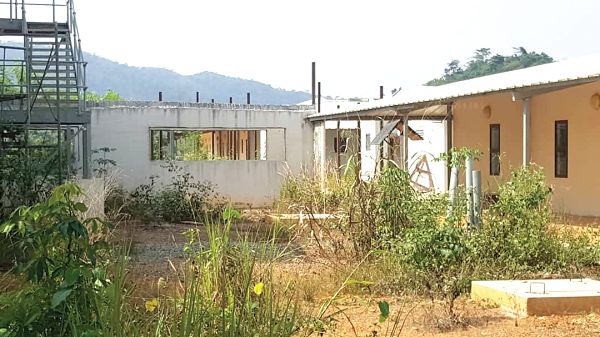The Mandela Washington Fellowship Association of Ghana have launched the maiden series of the #ElectionSeries to address the deficiencies in Ghana's healthcare system.
The recent Covid-19 pandemic that has plagued the world has exposed the cracks in the nation's health sector.
CEO of INCAS Diagnostics and 2016 Mandela Washington Fellow, Dr Laud Anthony Basing shared his insights on the state of medical laboratories in Ghana, revealing the many inadequacies in the country's laboratories.
“Unfortunately, most of these labs can do 55 per cent of what global standards demand. 45 per cent of the private labs that conduct tests for public hospitals, you cannot vouch for their results,” he noted.
Dr Basing attributed the challenge to the low budgetary allocation made to laboratories.
Some of the issues that came up during the session were under-resourced laboratories, neglected rural health facilities and poor access to healthcare.
In his view, despite the significant role labs play in the healthcare system, they are poorly under-funded. He explained that in 2004, there were 1.4 million tests with an average of cost GH¢50.
He stressed that rather than manufacturing medical reagents locally, more emphasis is laid on importing medical reagents for laboratory use.
“When you look at Noguchi and KCCR, these centres should have been at the forefront of the Covid-19 fight, they are supposed to lead research for vaccines and treatment, but, they are rather testing,” he observed.
Speaking on the theme "Access to Healthcare: Role of Innovation and Technology, the Public Health Specialist with a focus in data analytics, noted that it’s a complex topic given how many people view the subject of access.
Williams Kwarah observed that the National Health Insurance Scheme (NHIS) had encouraged an increase OutPatient Department OPD attendance.
“When you look at the data from 2014 to 2020, you would notice that 80 per cent of patients under the NHIS have been accessing healthcare,” he added.
Mr Kwarah said from 2016 to 2020, home visits by health officials at CHPS compound have seen a significant decrease.
The Public Health Specialist questioned whether the right information is being provided by health officials to the community disclosing that a number of NHIS subscribers are unable to access quality healthcare services.
He was concerned about equity in accessing healthcare between urban and rural centres.
Head of Research at IMANI Africa and 2019 Mandela Washington Fellow, Patrick Stephenson on his part noted that the #ElectionSeries was inspired to give voices to young leaders from the fellowship to make an input on the various sectors ahead of the December polls.
Touching on the maiden edition which focused access to healthcare in Ghana during the era of Covid-19, he explained that investment in healthcare has been relatively low.
“Investment in healthcare is a little less than 0.1 per cent of the GDP. It was only pushed to over 1.1 of the country’s GDP which represents an amount of GHS16 billion due to the challenges we are faced with,” he pointed out.
He added that the discussion is meant to draw the attention of duty bearers to the gaps in the key sectors of the economy for remedial action.
Acting Medical Superintendent in the Asunafo North Municipal District, Joel Afi, said the NHIS came to provide access to healthcare.
According to him, about 10 million people have subscribed to the NHIS, however, there is a significant percentage of rural folks who are not covered under the scheme.
This is he said was because they don’t have the financial access to pay their subscription.
Dr Afi stressed that once we are looking at access to healthcare services, the rural areas and hard to reach communities are sidelined in the equation.
Speaking on leadership in the health sector, Specialist Pediatrician with the child health department of the Korle Bu teaching hospital, Dr Hilda Boye, said the visually and hearing impaired groups tend to have a challenge with access to healthcare.
She pointed out that persons with disability continue to face barriers including how hospitals have been structurally designed.
She called on training on sign language experts to ensure confidentiality when those with hearing impairment visit the hospital.
Latest Stories
-
Flamengo stun Chelsea in another big Club World Cup upset
49 minutes -
Iran rules out new nuclear talks until attacks stop
54 minutes -
We’re not targeting anyone – GTEC fires back at ‘Dr’, ‘Prof’ title abusers
1 hour -
Ecobank-JoyNews Habitat Fair enters Day 2 with strong turnout
3 hours -
Ghastly accident at Bortianor Bus Stop claims life of pedestrian
4 hours -
Gold Board initiative yields $3 billion economic boost in 4 months – Kwakye Ofosu reveals
5 hours -
Kwakye Ofosu reveals money saved from paid TV ban at Jubilee House
5 hours -
14 Years of production: Ghanaians see oil as neither blessing nor curse — Research
6 hours -
Judge orders Columbia student Mahmoud Khalil released on bail
7 hours -
Dr. Peter Terkper declares GNAFF Presidency bid with bold vision
7 hours -
Teenage pregnancy declines in Akatsi North as leaders call for sustained action
8 hours -
NIB, NACOC destroy $350m worth of cocaine following court order
8 hours -
Keta-Akatsi Catholic Diocese honours health workers at 33rd World Day of the Sick
9 hours -
Suspect arrested for burglary and theft at Kasoa Nyayano
9 hours -
US resumes visas for foreign students but demands access to social media accounts
9 hours

